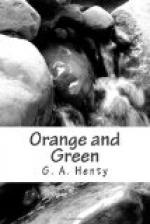He passed many groups of people as he rode. Some were Protestants, making their way to Dublin to join in the greeting to William and his army, on their arrival. Others were Catholics, afraid to remain in their abodes now that the army had retired west, and journeying to the capital, where they believed that William would prevent disorder and pillage. It needed no inquiry, as to the religion of the respective groups. The Protestants were for the most part men, and these came along shouting and waving their weapons, wild with exultation over the triumph of their cause. The Catholics were of all ages and both sexes. Many of them had carts, and were carrying with them their most valued possessions. All wore an expression of grief and anxiety.
As Walter rode into one village, a fray was going on. A party of Protestants, riding boisterously along, had knocked down a woman with a child in her arms, and had answered the angry remonstrance of the peasants with jeers and laughter. Stones had begun to fly. The Protestants had drawn their swords; the villagers had caught up hoes, spades, and other weapons, and a fierce fight was going on. The women, with shrill cries, encouraged the peasants, and aided them by hurling stones at the rioters. Walter saw that his interference would be of no avail, and, with a heavy heart at the bitter hatred which the two parties in Ireland exhibited for each other, he turned from the road, made a circuit round the village, and continued his way. After that, he avoided all towns and villages, and slept at night in the cabin of a peasant, lying some little distance from the road. The following day he again pressed on, and before evening overtook the retiring army.
On the arrival of King William with his army in Dublin, a proclamation was issued assuring all, save those who resisted his authority, of his protection, and threatening severity against those who disturbed the peace or committed outrage on personal property. Letters of protection were granted to all who applied for them and, hearing this, Jabez Whitefoot at once went into Dublin, to apply for protection for the family of Captain Davenant. On hearing, however, that no persecution of Catholics would be allowed, and that the army was likely to march west, at once, in pursuit of the Irish, he thought it better to leave the matter alone, as his application would only draw the attention of the authorities to the fact of Captain Davenant and his son being engaged in the hostile army. He felt sure that the ladies need fear no molestation, save from the soldiers or Northerners, as his own influence with the Protestants of his neighbourhood would suffice to prevent these from interfering with the household at the castle.
The Irish army marched towards the Shannon, and were concentrated part in the neighbourhood of Athlone, and part at Limerick. William shortly prepared to follow them. He, too, divided his army into two columns. The main body, under his own command, took the road to Limerick; while the other division, consisting of five regiments of cavalry and twelve of infantry, was despatched, under the command of General Douglas, for the purpose of investing the fortress of Athlone.




